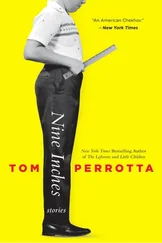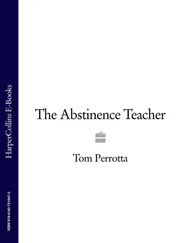Tom Perrotta - The Leftovers
Здесь есть возможность читать онлайн «Tom Perrotta - The Leftovers» весь текст электронной книги совершенно бесплатно (целиком полную версию без сокращений). В некоторых случаях можно слушать аудио, скачать через торрент в формате fb2 и присутствует краткое содержание. Год выпуска: 2011, ISBN: 2011, Жанр: Социально-психологическая фантастика, на английском языке. Описание произведения, (предисловие) а так же отзывы посетителей доступны на портале библиотеки ЛибКат.
- Название:The Leftovers
- Автор:
- Жанр:
- Год:2011
- ISBN:978-0-312-35834-1
- Рейтинг книги:3 / 5. Голосов: 1
-
Избранное:Добавить в избранное
- Отзывы:
-
Ваша оценка:
- 60
- 1
- 2
- 3
- 4
- 5
The Leftovers: краткое содержание, описание и аннотация
Предлагаем к чтению аннотацию, описание, краткое содержание или предисловие (зависит от того, что написал сам автор книги «The Leftovers»). Если вы не нашли необходимую информацию о книге — напишите в комментариях, мы постараемся отыскать её.
The Leftovers — читать онлайн бесплатно полную книгу (весь текст) целиком
Ниже представлен текст книги, разбитый по страницам. Система сохранения места последней прочитанной страницы, позволяет с удобством читать онлайн бесплатно книгу «The Leftovers», без необходимости каждый раз заново искать на чём Вы остановились. Поставьте закладку, и сможете в любой момент перейти на страницу, на которой закончили чтение.
Интервал:
Закладка:
Tom Perrotta
The Leftovers
For Nina and Luke
ACKNOWLEDGMENTS
I count myself lucky to be able to thank the usual suspects — Elizabeth Beier, Maria Massie, Dori Weintraub, and Sylvie Rabineau — for joining me in this Sudden Departure, and for their guidance along the way. Thanks also to Mary, Nina, and Luke, for each and every day.
PROLOGUE
LAURIE GARVEY HADN’T BEEN RAISED to believe in the Rapture. She hadn’t been raised to believe in much of anything, except the foolishness of belief itself.
We’re agnostics, she used to tell her kids, back when they were little and needed a way to define themselves to their Catholic and Jewish and Unitarian friends. We don’t know if there’s a God, and nobody else does, either. They might say they do, but they really don’t.
The first time she’d heard about the Rapture, she was a freshman in college, taking a class called Intro to World Religions. The phenomenon the professor described seemed like a joke to her, hordes of Christians floating out of their clothes, rising up through the roofs of their houses and cars to meet Jesus in the sky, everyone else standing around with their mouths hanging open, wondering where all the good people had gone. The theology remained murky to her, even after she read the section on “Premillennial Dispensationalism” in her textbook, all that mumbo jumbo about Armageddon and the Antichrist and the Four Horsemen of the Apocalypse. It felt like religious kitsch, as tacky as a black velvet painting, the kind of fantasy that appealed to people who ate too much fried food, spanked their kids, and had no problem with the theory that their loving God invented AIDS to punish the gays. Every once in a while, in the years that followed, she’d spot someone reading one of the Left Behind books in an airport or on a train, and feel a twinge of pity, and even a little bit of tenderness, for the poor sucker who had nothing better to read, and nothing else to do, except sit around dreaming about the end of the world.
And then it happened. The biblical prophecy came true, or at least partly true. People disappeared, millions of them at the same time, all over the world. This wasn’t some ancient rumor — a dead man coming back to life during the Roman Empire — or a dusty homegrown legend, Joseph Smith unearthing golden tablets in upstate New York, conversing with an angel. This was real. The Rapture happened in her own hometown, to her best friend’s daughter, among others, while Laurie herself was in the house. God’s intrusion into her life couldn’t have been any clearer if He’d addressed her from a burning azalea.
At least you would have thought so. And yet she managed to deny the obvious for weeks and months afterward, clinging to her doubts like a life preserver, desperately echoing the scientists and pundits and politicians who insisted that the cause of what they called the “Sudden Departure” remained unknown, and cautioned the public to avoid jumping to conclusions until the release of the official report by the nonpartisan government panel that was investigating the matter.
“Something tragic occurred,” the experts repeated over and over. “It was a Rapture-like phenomenon, but it doesn’t appear to have been the Rapture.”
Interestingly, some of the loudest voices making this argument belonged to Christians themselves, who couldn’t help noticing that many of the people who’d disappeared on October 14th — Hindus and Buddhists and Muslims and Jews and atheists and animists and homosexuals and Eskimos and Mormons and Zoroastrians, whatever the heck they were — hadn’t accepted Jesus Christ as their personal savior. As far as anyone could tell, it was a random harvest, and the one thing the Rapture couldn’t be was random. The whole point was to separate the wheat from the chaff, to reward the true believers and put the rest of the world on notice. An indiscriminate Rapture was no Rapture at all.
So it was easy enough to be confused, to throw up your hands and claim that you just didn’t know what was going on. But Laurie knew. Deep in her heart, as soon as it happened, she knew . She’d been left behind. They all had. It didn’t matter that God hadn’t factored religion into His decision-making — if anything, that just made it worse, more of a personal rejection. And yet she chose to ignore this knowledge, to banish it to some murky recess of her mind — the basement storage area for things you couldn’t bear to think about — the same place you hid the knowledge that you were going to die, so you could live your life without being depressed every minute of every day.
Besides, it was a busy time, those first few months after the Rapture, with school canceled in Mapleton, her daughter home all day, and her son back from college. There was shopping and laundry to do, just like before, meals to cook, and dishes to wash. There were memorial services to attend as well, slide shows to compile, tears to wipe away, so many exhausting conversations. She spent a lot of time with poor Rosalie Sussman, visiting her almost every morning, trying to help her through her unfathomable grief. Sometimes they talked about her departed daughter, Jen — what a sweet girl she was, always smiling, etc. — but mostly they just sat together without speaking. The silence felt deep and right, as if there was nothing either of them could say that could possibly be important enough to break it.
YOU STARTED seeing them around town the following autumn, people in white clothing, traveling in same-sex pairs, always smoking. Laurie recognized a few of them — Barbara Santangelo, whose son was in her daughter’s class; Marty Powers, who used to play softball with her husband, and whose wife had been taken in the Rapture, or whatever it was. Mostly they ignored you, but sometimes they followed you around as if they were private detectives hired to keep track of your movements. If you said hello, they just gave you a blank look, but if you asked a more substantive question, they handed over a business card printed on one side with the following message:
WE ARE MEMBERS OF THE GUILTY REMNANT. WE HAVE TAKEN A VOW OF SILENCE. WE STAND BEFORE YOU AS LIVING REMINDERS OF GOD’S AWESOME POWER. HIS JUDGMENT IS UPON US.
In smaller type, on the other side of the card, was a Web address you could consult for more information: www.guiltyremnant.com.
That was a weird fall. A full year had passed since the catastrophe; the survivors had absorbed the blow and found, to their amazement, that they were still standing, though some were a bit more wobbly than others. In a tentative, fragile way, things were starting to return to normal. The schools had reopened and most people had gone back to work. Kids played soccer in the park on weekends; there were even a handful of trick-or-treaters on Halloween. You could feel the old habits returning, life assuming its former shape.
But Laurie couldn’t get with the program. Besides caring for Rosalie, she was worried sick about her own kids. Tom had gone back to college for the spring semester, but he’d fallen under the influence of a sketchy self-appointed “healing prophet” named Holy Wayne, failed all his classes, and refused to come home. He’d phoned a couple of times over the summer to let her know he was okay, but he wouldn’t say where he was or what he was doing. Jill was struggling with depression and post-traumatic stress — of course she was, Jen Sussman had been her best friend since preschool — but she refused to talk to Laurie about it or to see a therapist. Meanwhile, her husband seemed bizarrely upbeat, all good news all the time. Business was booming, the weather was fine, he just ran six miles in under an hour, if you could believe that.
Читать дальшеИнтервал:
Закладка:
Похожие книги на «The Leftovers»
Представляем Вашему вниманию похожие книги на «The Leftovers» списком для выбора. Мы отобрали схожую по названию и смыслу литературу в надежде предоставить читателям больше вариантов отыскать новые, интересные, ещё непрочитанные произведения.
Обсуждение, отзывы о книге «The Leftovers» и просто собственные мнения читателей. Оставьте ваши комментарии, напишите, что Вы думаете о произведении, его смысле или главных героях. Укажите что конкретно понравилось, а что нет, и почему Вы так считаете.












